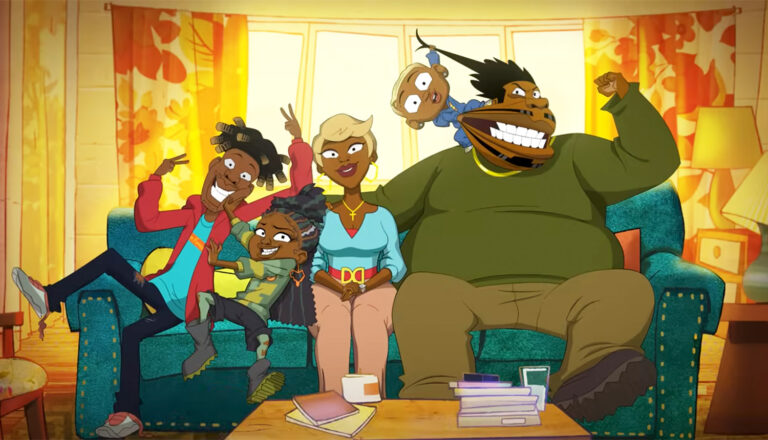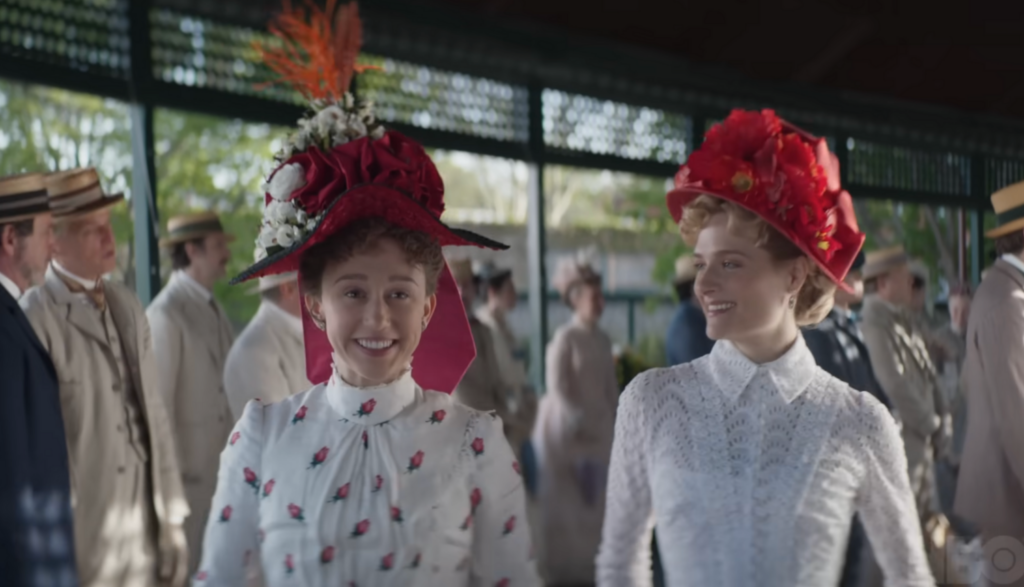
Good Times
Netflix takes a classic sitcom, Good Times, and turns it into a vulgar, violent, sexually-charged TV-MA show.

The Gilded Age, which took place between the 1870s and 1900, was an era of rapid economic growth and industrialization in the United States. Shaking off the horrors of the Civil War, the age was a boon to many. Ever-growing railroads allowed for quicker-than-ever cross-country travel. Increasing wages brought an influx of skilled workers from Europe.
Of course, it wasn’t perfect.
As we see in this HBO Max take of the age, African-American people are still mistreated. Additionally, the old class system prevents anyone—regardless of race or newly acquired wealth—to move up in society.
Which means that the people who hold the power, make decisions and could bring about change in America are the same people whose families brought about the Civil War to begin with.
But not everyone is on board with that old, broken system.
Marian Brook, an impoverished orphan, moves to New York to live with her wealthy aunts: Mrs. Agnes van Rhijn and Ms. Ada Brook.
Immediately, she’s told that because the Brooks have lived in Pennsylvania for more than a century (not to mention that her grandmother was a Livingston), she’s part of old—and therefore proper—New York society.
“Never the new!” Agnes scoffs.
Much to Agnes’ chagrin, Marian isn’t satisfied acting as a figurehead for her aunt’s money, supporting various charities while waiting to scoop up a wealthy (and societally suitable) husband.
She challenges her aunts by befriending, Peggy Scott, a Black woman who aspires to be a writer. She believes in marrying for love, not money or status. And she disobeys Agnes’ orders to avoid their new neighbors, the Russells, at all costs.
Because the Russells didn’t inherit their money. They earned it.
A shrewd businessman, George Russell steps on the toes of New York’s more established families, putting a few men out of business after they rescind his generous business offers. His wife, Bertha, is determined to force society to accept them—if not for her own sake, then at least for that of her children, Larry and Gladys, who are ready to make their own way in the world.
It won’t be easy, but maybe, just maybe, Marian and the Russells can help bring about the type of change in New York society that will launch America into a new age of equality and respect.
From Julian Fellowes, the creator of Downton Abbey, comes The Gilded Age. And much like Downton, it focuses on change.
But The Gilded Age’s content concerns would make Downton’s unflappable dowager, Violet Crawley, blush.
First, that class system I mentioned. Quite besides the fact that it encourages racism, sexism and classism, it also puts a lot of focus on wealth. So when folks don’t get their way, they usually throw money at the problem, making it even harder for the marginalized to find their way in the world.
Carnal contact outside wedlock is certainly considered scandalous, but that doesn’t mean it doesn’t happen. Some of these excursions are between same-sex couplings. And there’s certainly a lot more nudity (we see some bare rears and exposed breasts) than Downton ever displayed.
There’s some mild language, too. And while violence doesn’t happen often, it does pop up every now and then. (One man takes his own life in Season One. We don’t see the act directly, but we see him put a gun to his head just before and his still-bleeding corpse after.)
The Gilded Age, rated TV-MA, isn’t as squeaky clean as Downton Abbey (the series stayed at TV-PG through its six season run and the films were also PG), and that will probably cause families to lean into Agnes’ prejudice of “never the new.”
Peggy and her family mourn the death of Peggy’s son. Bertha sponsors the new Metropolitan Opera House after she’s denied a box at the prestigious Academy of Music. And George and other businessmen prepare to put a stop to unionizing.
Nearly everyone attends church for Easter Sunday. However, characters are separated by class and race. We hear a bit about the resurrection of Christ from the various clergymen. A family says grace before a meal.
Peggy mourns the death of the son she never knew. (She had married against her father’s wishes and then became pregnant. However, her father had the marriage annulled and then convinced Peggy that the child had been stillborn, arranging for the boy to be adopted.) The whole family, including the boy’s adopted family, grieves his and his adoptive mother’s loss (they passed away from Scarlet Fever). Peggy’s mother is bitter toward her father for his deception. But he apologizes and expresses true remorse.
We hear about a girl whose mother died when she was young.
After seeing his former lover with another man, Oscar goes to a gay bar to find a new beau. However, he returns home bloodied, beaten and robbed. (The man he had tried to woo allegedly attacked him.) Oscar lies to his family about the circumstances of the attack since he doesn’t want them to discover he’s gay. And he resolves to “grow up” and marry a woman to secure his future. We hear another gay man will never marry a woman since he considers it too great a lie.
Oscar’s former lover kisses his hand, and they worry that a maid saw them. Oscar later kisses the hand of a woman after proposing to her.
People smoke and drink throughout, sometimes at bars.
It’s clear that church is more of a fashion show and who’s who for the American socialites (as noted by a couple of characters). A woman flaunts her wealth to manipulate some characters into supporting her cause and to brag to others about what she’s capable of. Wealthy businessmen complain about the demands of unions (which mostly have to do with fair wages, hours and safety standards). We hear about a woman who married a man much older than herself for his money.
Characters lie and often act snobbish. When it’s discovered that Marian has been secretly teaching at a school, Agnes is embarrassed since it’s lower class. She and Marian shout at each other (which Marian later apologizes for). Servants gossip about the people they work for. (An elite man is furious to discover his wife’s father has become a servant.)
God’s name is misused twice. Someone exclaims, “Thank heavens!”
A Black woman says her husband saved her life when they first met by scaring off two white men who were harassing her.
Marian moves in with her aunts. Peggy gets a job as Agnes’ secretary. The Russells attempt to make their societal debut.
Two men get into a fistfight on a train platform, knocking some women over. As they run off, one of them steals the unattended purse of one of the ladies. Some servants make light of old people passing away. We hear a man was shot. A dog is nearly run over by a carriage, but a man saves it.
We hear that Marian’s father squandered his family’s fortune, leaving his two sisters destitute (and later Marian as well), forcing Agnes to marry an abusive man.
A married couple kisses. A gay couple kisses and begins to remove their clothes. We see some cleavage and exposed shoulders. There’s a reference to prostitution. A man says his son has “oats to sow.” A maid flirts with her married boss.
We see lots of racial segregation, which was common (if wrong) for the era. Some immigrant workers worry that Black people will take their jobs (and are rude to Peggy for this reason).
People drink and smoke. Characters lie and double-cross. Marian sneaks out of her aunt’s house to go to a party she’s been forbidden to attend. People are rude to the Russells and other “lower” class members of society.
We hear uses of “b–tard,” “d–n” and “h—.” There are several phrases of exclamation including the word “heavens.” Someone says, “why the devil?” Someone says Marian is “manna from heaven.”


Emily studied film and writing when she was in college. And when she isn’t being way too competitive while playing board games, she enjoys food, sleep, and geeking out with her husband indulging in their “nerdoms,” which is the collective fan cultures of everything they love, such as Star Wars, Star Trek, Stargate and Lord of the Rings.

Netflix takes a classic sitcom, Good Times, and turns it into a vulgar, violent, sexually-charged TV-MA show.

While its protagonist might live a nuanced life, The Sympathizer’s problematic content can’t be described the same way.

Say hola once again to the iconic explorer in this faithful reboot of the children’s series.

Based on a popular video game, Ark: The Animated Series features hungry dinosaurs, bloodthirsty people and plenty of problems.